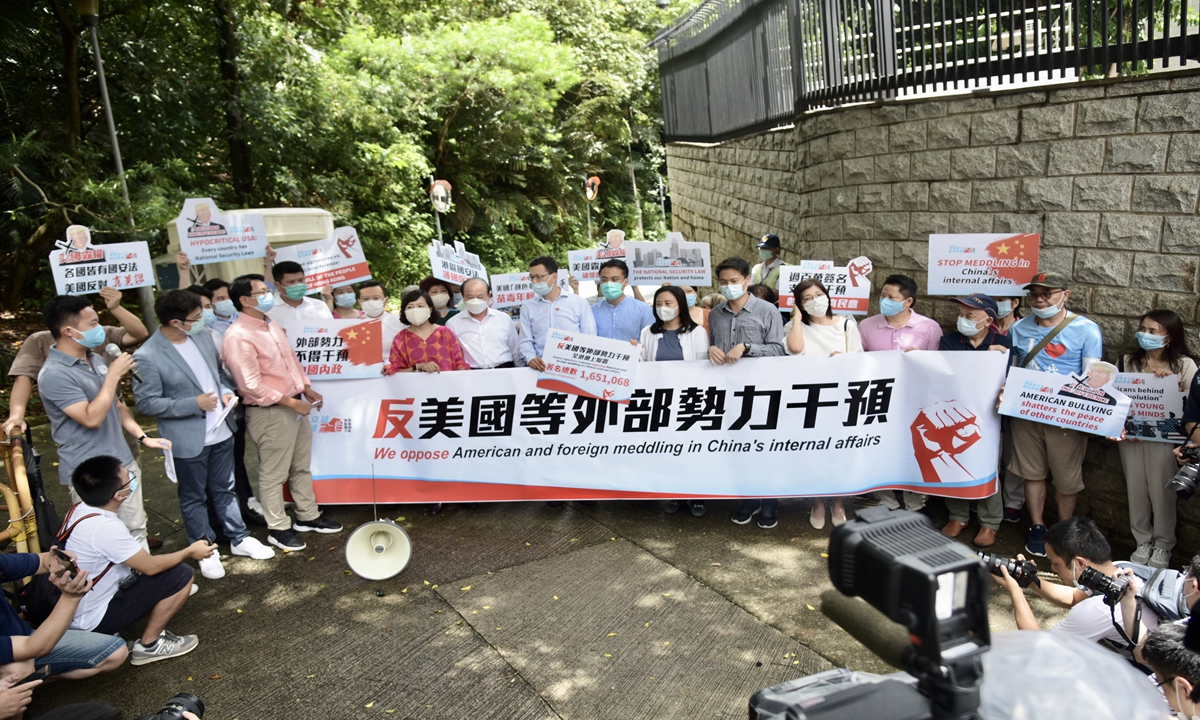US Consul General in HK meeting with riot instigators a dangerous move: observers

A group of Hong Kong residents gather outside the US Consulate General Hong Kong and Macao in Central Hong Kong to protest against US interference in China's domestic affairs and Hong Kong affairs: Photo: cnsphoto
Observers said the meeting between the US Consul General in Hong Kong and the instigator of domestic riots is a dangerous move that could be in violation of the national security law.
Hanscom Smith, the US Consul General representing the US in Hong Kong and Macao, met the pan-democratic Civic Party chairman Alan Leong Kah-kit at Leong's law offices on Tuesday, which is seen as a test and challenge for the national security law for the Hong Kong Special Administration Region (HKSAR).
Leong's party colleague Alvin Yeung Ngok-kiu was also found to have attended the meeting, which lasted one and a half hours, Hong Kong media outlets reported, saying it was the first meeting since the enactment of the national security law for Hong Kong.
The national security law for HKSAR made it clear that secession, subversion, terrorism and collusion with foreign forces to endanger national security will be punished, and the maximum penalty is life in jail.
Leong told local media that the meeting had been arranged weeks ago, and is a regular one that gives recent updates on Hong Kong.
Li Xiaobing, an expert on Hong Kong, Macao and Taiwan studies at Nankai University in Tianjin, told the Global Times on Wednesday that the US consulate in Hong Kong and Macao was making trouble on its own initiative and raising tensions, which is a dangerous move for Hong Kong's stability and China-US ties.
Before the HKSAR government announced the postponement of Legislative Council elections due to the new COVID-19 outbreak, 12 pan-democractic candidates had been disqualified, including four from Leong's party. Media reported that the four candidates visited the US in August 2019 amid the social unrest, and begged US lawmakers to pass the Hong Kong Human Rights and Democracy Act.
The deputy head of the party admitted that they were in crisis after spending at least HK$3 million ($387,000) on election preparations, but would not receive any subsidies from the government due to their disqualification. Netizens suspected that the meeting was aimed at gaining US support for riot leaders and their groups.
If there is conclusive evidence of colluding and interference, China will be able to retaliate diplomatically by expelling undesirable people from the consulates, Li said.
Hanscom Smith took up his post as the consul general in July, 2019. Hong Kong media reported that he met riot leader Martin Lee Chu-ming in August amid Hong Kong's social unrest.
In August 2019, Julie Eadeh, the political unit chief of the US consulate in Hong Kong and Macao, met with secessionist leaders, including Joshua Wong, Nathan Law Kwun-chung and Martin Lee Chu-ming, media reported.
In a previous poll launched by Global Times after the US ordered the closure of China's consulate in Houston, the US consulate in Hong Kong and Macao topped social media polls on the "US consulate in China most likely to be closed", which observers said reflected Chinese public's anger over US meddling in Hong Kong affairs and a warning to US "intelligence hegemony."